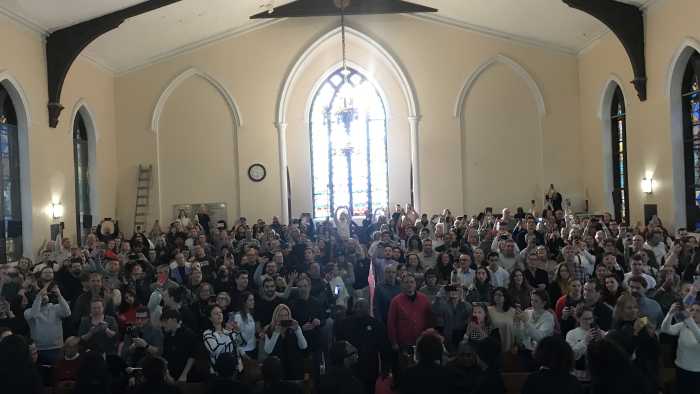By ADRIENNE URBANSKI
MARTHA WAINWRIGHT Sings Edith Piaf!
Sept. 16 at 10 p.m.
Spiegelworld
Pier 17 at the South Street Seaport
South Street & Beekman Street
$35; 212-279-4200; spiegelworld.com
As the daughter of musicians Loudon Wainwright III and Kate McGarrigle, Martha Wainwright spent her childhood in the shadow of the spotlight. Now 32, the Brooklyn-based singer wasn’t eager to leap into stardom. She tried to shake off her place in the family musical tradition, trying her hand at acting and playwriting, eventually joining her brother, Rufus, as his regular backup singer. In the mid-90s, she set out to find her own voice, abandoning her hometown of Montreal to play the gritty clubs of New York.
Released in 2005, Wainwright’s eponymous debut album expressed anger towards both her often-absent father and a male-dominated music industry she found difficult to break into. Her new album, “I Know You’re Married But I Have Feelings Too,” possesses more confidence, representing a shift Wainwright credits to her recent marriage [to her producer Brad Albetta]. On the record, she expands her repertoire with varied musical styles, and, on “Cheated Me,” even flirts with radio-friendly pop. Following her concert this Friday at Radio City Music Hall, where she opens for Goldfrapp, next Tuesday Wainwright further displays her versatility by channeling Edith Piaf.
ADRIENNE URBANSKI: Has Piaf been an inspiration to you?
MARTHA WAINWRIGHT: Absolutely, I’ve been a fan since I was a kid. Her ability to put herself into every word that she sings is something I’ve tried to emulate. I am not trying to portray her as an actor would, but to honor her and the French songs of that era.
Do you see a similarity between your music and hers?
I’ve always been touched by singers who wear their story on their sleeves and bring it into songs. She gave herself fully in every song and was very much an icon at the front of a movement.
How has your brother [Rufus Wainwright] influenced you?
He’s my greatest mentor. I’ve gotten to see him mold an entire career based on his total innovations and individuality.
Your mother and sister sing on your new album. How does collaborating with family differ from working with hired musicians?
Working together creates a chance for us to visit. Rufus and I have been on the road touring for so long that we rarely get a chance to see each other. When I run out of ideas I call Rufus, because he doesn’t ever run out of ideas. It’s great to be able to get my family involved and have them infuse my work with their genius.
Your first album expressed a lot of anger and resentment towards men. Has getting married changed this at all?
It’s taken the focus off the unattainability of men, which I struggled with as a younger person. It’s nice not to be defined by that desperation any longer and to have a partner to walk through life with.
Is your new album’s title a reference to your marriage?
The title is supposed to be funny. Sometimes life imitates art; obviously, marriage was on my brain. It’s sort of strange and disturbing but I like being that way sometimes.
One of your earlier songs expresses a wish to have been born a man. Did you ever feel that way?
I was referring to how, when I first started making music and the guys out there who were singing and playing the guitar had a lot of confidence without reason, I envied that. It takes a lot of ego to get up and sing your songs night after night. It was difficult, but it’s something I’ve been finally able to do without turning into a man, which is good, because that would have been messy.
With your first album, it was noteworthy that you were a young singer who wasn’t being primarily marketed as sexy. Do you feel pressure to be physically attractive in order to sell records?
I’m interested in presenting strength and vulnerability—these two sides of myself—in my music. Hopefully I am sexy in an unusual way, but if not I don’t really care. I just want to serve the song, to have the meaning show. The words come out however they do, whether it’s sexy or not.
Does having studied acting enable you to better convey emotion in your performances?
I think so. We have many different characters within us, it’s neat to be able to tap into those different things and project it onstage. It’s been helpful in terms of physical awareness. It’s also been helpful that in the past few years I have become so much more confident.


































